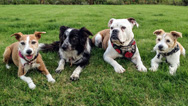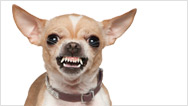Five Dogs with Crazy Ré...
- By Anna Rothschild
- Posted 04.10.14
- NOVA
Why do some dogs have short fur, others long tails, and still others wrinkly faces? Many dogs were bred to perform a specific tasks—from hunting vermin to wrangling bulls—and their physical characteristics were chosen to help them do their jobs.
Transcript
Five Dogs with Crazy Résumés
April 10, 2014
Your pooch might be an adorable pet today, but it’s quite likely that she was once more than just a cuddly companion. Many dogs were bred to perform a specific task, and their physical characteristics were selected to make them great at their jobs. Here are five dogs with crazy résumés.
St. Bernards were once search and rescue dogs in the Alps. They were kept by monks at a hospice on a treacherous path between Switzerland and Italy and saved travelers from snowy deaths. Originally, St. Bernards had relatively short hair and a great sense of smell to find victims. But in the mid-1800s, the hospice workers mixed them with another, longer-haired dog in the hopes of improving the breed. The result? A larger dog with longer hair that accumulated snow. These longer-haired dogs made poor rescue animals, so they were given away to villagers living nearby. And today there are still long- and short-haired varieties of the breed.
Poodles were bred to be hunting dogs. They have moisture resistant coats, which made them great at fetching prey out of the water. So, what’s with the fancy haircut? Some people say that shaving the dog may have made poodles more hydrodynamic. And the strangely placed tufts of hair were left to protect their joints from cold water. (Other people disagree and think the haircut was first given to poodles who were performing in the circus.)
Dachshunds were originally bred to hunt badgers. Their long bodies and short legs make them great at squeezing into badger dens and maneuvering. They also have strong lower jaws to kill their prey. On top of that, they have tails that are long enough for hunters to grab onto to pull the dogs back out of holes.
The Komondor is from Hungary, where it was used to guard flocks of sheep. Its mop of dreadlocked white hair helped the breed blend in with the livestock. The corded coat is also very thick and could protect the animal if a wolf attacked.
Bulldogs got their name because they were bred to be “bull baiters” in Europe. The dogs would grab a bull by the nose and pin it to the ground, distracting it while the butcher brought his cows in to be milked or slaughtered. Bull baiting was later turned into a sport, but was outlawed in England in the 1800s. Bulldogs have muscular shoulders, large heads, and strong jaws to withstand being shaken by bulls. Their noses are set back to ensure that they could still breath while holding the bull down with their teeth, and the wrinkles around their faces were meant to keep blood from running into their eyes. Despite this fearsome occupation, bulldogs are actually quite gentle animals and are known for being loyal and good with children.
Dogs had tons of other jobs, too, and many dogs still perform the jobs they were bred for. But others have found new roles. Some dogs guide the blind, and some have become therapy animals. And some dogs have found jobs you might never have expected.
Credits
PRODUCTION CREDITS
- Written, Produced and Narrated by
- Anna Rothschild
- Production Help from
- Mark Zastrow
- Original Footage
- © WGBH Educational Foundation 2014
MEDIA CREDITS
- Music: Monkeys Spinning Monkeys
- Incompetech/Kevin MacLeod (CC BY 3.0)
- 335/365-A New Camera
- Flickr/ShutterRunner (CC BY-NC 2.0)
- A Bull and a Bulldog Are About to Attack Each Other
- Wellcome Images/Francis Barlow (CC BY 4.0)
- A Shaggy Dog Story!
- Flickr/foxypar4 (CC BY 2.0)
- Babygirl, English Bulldog Puppy
- Flickr/Amber Rosenbaugh (CC BY-NC 2.0)
- Barron
- Flickr/I_am_Allan (CC BY-NC 2.0)
- Barry
- Wikimedia Commons (Public Domain)
- Cheguel!
- Flickr/Ana_Cotta (CC BY 2.0)
- Black Labrador Retrievers portrait
- Wikimedia Commons/mrpattersonsir (CC BY 2.0)
- Cara de quen caui do caminhí£oâ¦
- Wikimedia Commons/Anderson Nascimento (CC BY 2.0)
- CH_Renaissance_Hopeful_Impulse Wikimedia Commons/Belinda Hankins Miller (CC BY 2.0)
- Clyde The Bulldog
- Wikimedia Commons/Asmadeus (Public Domain)
- CockerSpanielPup
- Wikimedia Commons/LeCardinal (CC BY 3.0)
- Dog Sled Rides (6836608704)
- Wikimedia Commons/Denali National Park and Preserve (CC BY 3.0)
- Great St Bernard Pass
- Wikimedia Commons/Soumai Baba (CC BY 2.0)
- Guide dog golden retriever
- Wikimedia Commons/Hurricane Omega (Public Domain)
- Komondor delvin
- Wikimedia Commons/Nikki68 (CC BY 2.5)
- Meyerhime.sideshow.1891
- Wikimedia Commons/Paul Meyerheim (Public Domain)
- Miniature Schnauzer Toy
- Wikimedia Commons/SheltieBoy (CC BY 2.0)
- Rottweiler-Head
- Wikimedia Commons/Rains27 (Public Domain)
- Samuel Henry Alken – Bull Baiting
- Wikimedia Commons/Samuel Hentry Alken (Public Domain)
- Schnoodle2
- Wikimedia Commons/Vontafeijos
- Siberian Husky bi-eyed Flickr
- Wikimedia Commons/re-ality (CC BY 2.0)
- Silver Miniature Poodle stacked
- Wikimedia Commons/Belinda (CC BY 2.0)
- Smooth Miniature Dachshund puppy
- Flickr/Lachlan Hardy (CC BY 2.0)
- File: Weenix A dog over a dead boar
- Wikimedia Commons/Jan Weenix (Public Domain)
- The Dog Barber
- Wellcome Images/Henry William Bunbury (CC BY 4.0)
- Brantini Show Pictures
- © Marilyn Santell
- Early to Rise, Early to Bed
- Flickr/Randy Son Of Robert (CC BY 2.0)
- Ella the Snow Dog
- Flickr/jpctalbot (CC BY 2.0)
- Bo the poodle retrieving a duck
- Wikimedia Commons/Sally Eller (Public Domain)
- Deiker Jagdbare Tiere 1093210
- Wikimedia Commons/Carl Friedrich Deiker (Public Domain)
- Parti-colour Longhaired Dachshund
- Wikimedia Commons/Raven Underwood (CC BY 2.0)
- Explore!
- Flickr/Lacklan Hardy (CC BY 2.0)
- goofus, jr.
- Flickr, greg westfall. (CC BY 2.0)
- Standing Proud
- © The Komondor Club of Great Britain
- Oscar With His Friends
- © The Komondor Club of Great Britain
- Nelson, Skateboarding Dog
- Flickr/CarbonNYC (CC BY 2.0)
- No Strings
- Flickr/Emery_Way (CC BY 2.0)
- Snoozing 2
- Flickr/one.juniper (CC BY-NC 2.0)
- 1 Papillon
- Wikimedia Commons/2010 PA Kennel Assoc. Dog Show (CC BY 2.0)
- Pomeranians
- Wikimedia Commons/MissTessmacher (CC BY-NC 2.0)
- Retrieving Golden Retriever in Water
- Flickr/rkleine (CC BY-NC 2.0)
- Saint Bernard in Field
- © Mary Bloom
- St. Bernard Puppy Six Weeks Old
- Flickr/ATIS547 (CC By-NC-SA 2.0)
- St Bernhard dog (bw)
- Wikimedia Commons/Michael Huwiler (Public Domain)
- St. Bernard puppy
- Wikimedia Commons/dbking (CC By 2.0)
- St. Bernard – To The Rescue by John Emms (artist)
- Wikimedia Commons/John Emms (Public Domain)
- Truth Was All Around Me
- Flickr/Thomas Hawk (CC BY-NC 2.0)
- We Will Fight Them On The Beachesâ¦
- Flickr/me'nthedogs (CC BY-NC 2.0)
- Wondering
- Flickr/snailsareslimy (CC BY 2.0)
IMAGE
- (main image: St. Bernard Puppy)
- Wikimedia Commons/dbking (CC BY 2.0)
Related Links
-

Inside Animal Minds
In this series, go inside the brains of three smart animals—dogs, birds, and dolphins.
-

The Clever Dog Lab
An animal research laboratory in Vienna enlists local pets to study the roots of canine personality.
-

The Meaning of Dog Barks
Listen to a variety of dog barks—from woofs to whines—and try to interpret their meaning.
-

Dogs' Dazzling Sense of Smell
What lies behind their exceptional gift of sniff?

